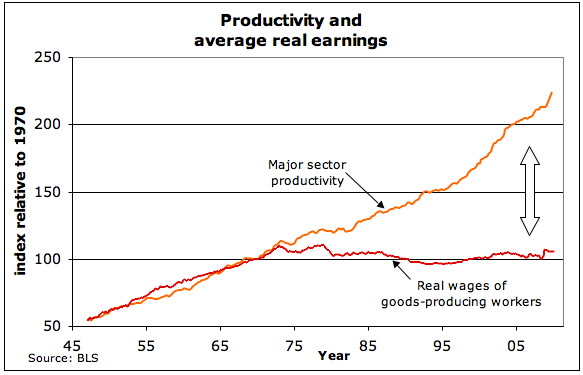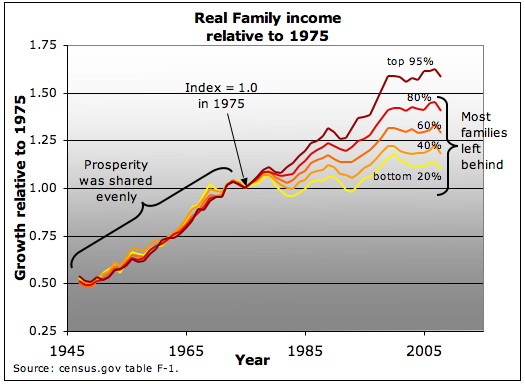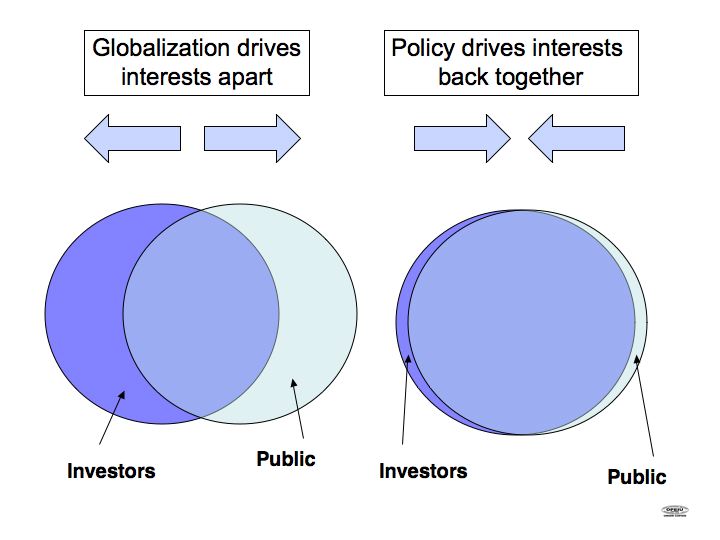We all want to create jobs and encourage economic recovery. We now have over 30 years of experience with trickle-down policies. What has worked, and what needs change?
For the last few decades, the basic idea was to "make industry succeed." That principle drives our policies in trade, education, R&D, and capital investment. Policies are designed to make business competitive. We assume that as industry succeeds, workers would share in future gains.

Our policies make business succeed, but workers and communities are left behind.
The first part works -- business is competitive. The second part -- where workers share in the success -- has been a different story. Wages, adjusted for inflation, have been flat since the early 70's. The effect on family income has been dramatic.

Since 1975, the top 5% of families have continued to prosper. Families lower in the income profile have fallen behind. Three decades of stagnant wages will make economic recovery exceptionally difficult.
Globalization and Offshoring
One consequence of globalization has been to de-couple workers' success from the success of their employers. 
Of course, we do want business to succeed. However, it is no longer enough, just for business to be "competitive," which really means profitable. We also need workers to share in the success that businesses will enjoy.
I want business to succeed for one reason -- shared prosperity; to improve my family's well-being, and well-being in my community, and the well-being of others we interact with.
The goal of public policy is to realign the interests of investors and the public, so that prosperity is broadly shared.
Any global business can compete very well by investing offshore, moving production to low-wage countries, and de-industrializing our domestic economy. Policies that de-industrialize our economy also compromise our future. As our industrial base shrinks, producers in other countries gain a strategic advantage in new industries like solar energy, flat panel displays, hybrid vehicles, high-speed trains and communications.
Our consumption-based economy relies on prosperous customers. In the long run, consumption cannot increase faster than incomes. It has now "been the long run." We can have either lower wages or prosperous customers. We cannot have both.
If we want stronger communities, opportunity and fairness, shared prosperity and a better future for our children, we need to redesign policies that pull investment into our domestic economy and create good new jobs in local communities.
In policy terms, rising wages should be an explicit, clearly-stated goal, directly coupled to "making business succeed."
Industrial Policy and Investment
Other countries are comfortable with a social contract, which basically says, "Public resources create an attractive business environment. In return, business invests in the industrial base for the domestic economy." This quid pro quo can be implicit or explicit, but it defines a reciprocal obligation. We do this for you, and we expect that in return.
This is the defining characteristic of industrial policy. Industrial policy should carry through to trade policy, education, investment in R&D, and public infrastructure.
To some extent, industrial policies are the opposite of free-market policies. Free market policies always help business succeed. Effective industrial policies explicitly include the interests of workers and communities. We can easily measure the difference between an effective industrial policy and open-ended market processes. When we make public investment in R&D, we should see jobs created in Ohio, Oregon and Oklahoma, rather than in China, Colombia and Cambodia.
Trade rules should honor non-economic conditions that align with our values as a society. If domestic goods must conform to rules for environmental quality, human rights labor rights, and public health, then the same rules should apply generally to all products, foreign and domestic. This is the opposite of our current free trade policies.
To capitalize on our public investments, we will need performance conditions explicitly connected to investment in local communities. When performance conditions are not met, we can invoke clawbacks or we can recapture our public subsidies. This is very different from free market policy.
State and local governments use performance conditions and clawbacks, with some regularity. (Some better than others.)
Investment in public education should be matched to a commitment from businesses to hire domestic students. This is the opposite of declaring a labor shortage, and importing hundreds of thousands of foreign high-tech workers, who will have no bargaining power in the labor market.
We earnestly invest public funds in research and development. Federally funded R&D is perhaps the strongest point of policy leverage we have, measured in dollar terms. When public resources are used to develop new products we should commercialize them with a performance condition regarding domestic content.
Making business succeed is not an end in itself. In the long run, business succeeds when prosperity is shared with workers, and communities, and when we invest in America's future.
